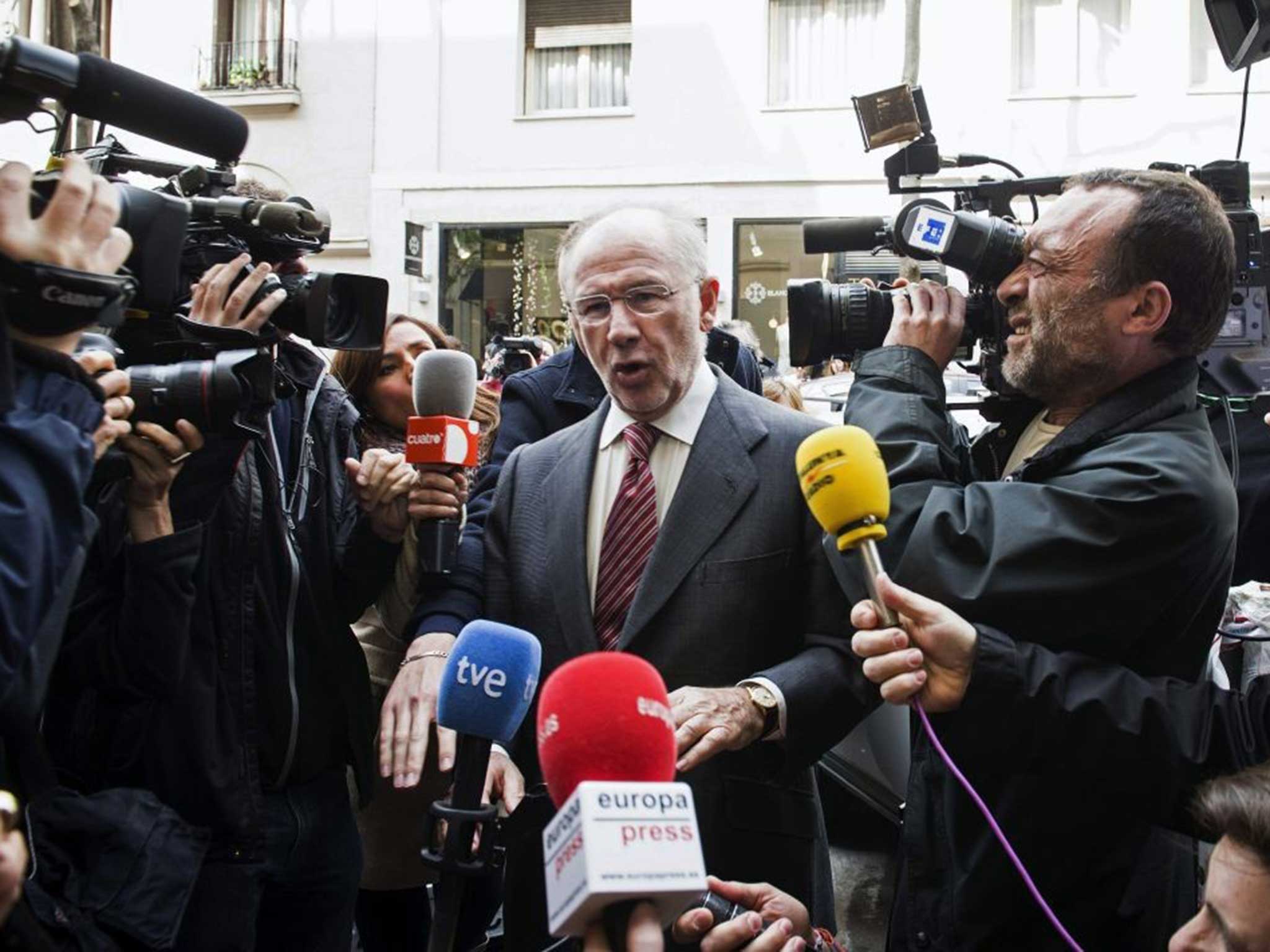Rodrigo Rato: Humiliation for ex-IMF chief held as part of tax fraud probe
Rato investigated over 'repatriated earnings' as yet another financial scandal engulfs Spanish politics

Your support helps us to tell the story
From reproductive rights to climate change to Big Tech, The Independent is on the ground when the story is developing. Whether it's investigating the financials of Elon Musk's pro-Trump PAC or producing our latest documentary, 'The A Word', which shines a light on the American women fighting for reproductive rights, we know how important it is to parse out the facts from the messaging.
At such a critical moment in US history, we need reporters on the ground. Your donation allows us to keep sending journalists to speak to both sides of the story.
The Independent is trusted by Americans across the entire political spectrum. And unlike many other quality news outlets, we choose not to lock Americans out of our reporting and analysis with paywalls. We believe quality journalism should be available to everyone, paid for by those who can afford it.
Your support makes all the difference.Rodrigo Rato was once one of the most established of establishment figures in Spain. He held a string of important cabinet jobs and went on to head the IMF, before chairing one of the country’s biggest banks. But on Friday morning, as he left prison after an overnight stay, he promised to help the tax authorities who raided his office and home in an up-market district of Madrid on Thursday evening as part of a wide-ranging probe into tax and money laundering.
The 66-year-old is suspected, along with others, of illegally repatriating foreign assets.
“What is being investigated by the anti-money laundering authority is whether the source of those repatriated earnings was legal or illegal,” Spain’s Justice Minister, Rafael Catalá, told the local Efe news agency.
The authorities made little effort to conceal Mr Rato’s role in the investigation with photographers and cameramen swarming around his home as the search took place.
In Friday’s newspapers, the front page picture of choice was of an official guiding Mr Rato – hand on the back of his head – into a waiting car.
Mr Rato, who has not been charged with any offence, and denies any wrongdoing, said after his release: “I am home and I am free.”
He added that he had full confidence in Spain’s judicial system. And that is just as well, because he is likely to spend much of his time dealing with it in the future.
As well as this case, Mr Rato is embroiled in to two other investigations involving his time as chairman of the stricken bank, Bankia.
He resigned as the bank’s head in 2012, amid growing concerns about its solvency. A year before his departure, the bank announced profits of €309m, which were later revised to losses of €3bn. Days after he left, the bank was effectively nationalised by the Spanish state.
Not only has Mr Rato been charged with his role in the collapse of the bank, in October last year it emerged that he, and other leading executives, had held so-called ‘black credit cards’ – used for personal payments, which were not taxed and did not appear anywhere on the bank’s balance sheet.
Despite earning an annual salary of €2.3m until 2011, Mr Rato bought 519 items on his card, totalling almost €100,000. Mr Rato denies any wrongdoing in either of the cases involving Bankia.
Between 1996 and 2004 Mr Rato was Spain’s economics minister, and also served as the country’s deputy prime minister.
In 2004 he was made managing director of the International Monetary Fund, before being replaced in 2007 by Dominique Strauss-Kahn.
This week’s developments are especially damaging to the People’s Party. The party faces local and regional elections on 24 May, and a general election later in the year. The party claims that it is fixing Spain’s battered economy, but is finding it difficult to brush off yet another corruption scandal that has implicated other senior party officials.
Luís Bárcenas, a former PP treasurer, is accused of running secret slush funds that benefitted leading party figures, including Prime Minister, Mariano Rajoy.
Mr Bárcenas and 39 others have been ordered to stand trial over the slush funds, and embezzling €449m of taxpayers’ money. While Mr Rajoy has not been charged, he is accused by Mr Bárcenas of accepting payments when he was a minister in 1997.
Mr Rajoy denies any wrongdoing, as does Mr Bárcenas. The trial is expected to take place next year, after the general election.
Join our commenting forum
Join thought-provoking conversations, follow other Independent readers and see their replies
Comments